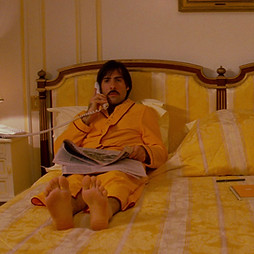
34.107848320645566, -118.32347351430177
Cinema. The colours key
The world of film and its skillful use of light is a continuous source of inspiration for us at LightScene Studio / Graphic Bureau. We execute our lighting projects with the meticulousness of detail with which the photography of a set is curated; we strive to shape light with all the elements at our disposal to create true lighting scenes. Light thus becomes a tool at our disposal, a valuable ally that helps us enhance spaces and tell one (or more) stories. Just as the cinematographer of a great film arms himself with tripods and reflectors to find the best shot so do we, always looking for the best combination of light and shadow to bring out colors, surfaces, volumes, textures.
Usually, we think of an apple as being red.
This is not the same red as that of a cherry or tomato.
A lemon is yellow and an orange is like its name.
Bricks vary from beige to yelloy to orange, and from ochre to brown to deep violet.
Foliage appears in innumerable shades of green.
In all these cases the colors named are surface colors.
In a very different way, distant mountains appear uniformly blue, no matter wheter covered with green trees or consisting of earth and rocks. The sun is glaring white in daytime, but is full red at sunset. The white ceilings of houses surrounded by lawns or the white-painted eaves of a roof on a sunny day appear in bright green, which is reflected from the grass on the ground. All these cases present film colors.

For a very different color effect compare the coffee in a cup with the coffee in the stem of percolator or with the coffee in a silex glass. It is easy to discover that, though all 3 containers hold the same coffee, the containers show this coffee in 3 different browns: lightest in the stem, darker in the cup, darkest in the silex glass.
Here we are dealing with volume color.

Both film color and volume color might be considered tricks of nature.
This is also what happens in cinema, where the use of colors serves to direct the viewer's emotions, and light becomes the main tool for generating states of mind.

passion
danger
power
Macbeth
Justin Kurzel
2015
.jpg)
corruption
darkness
danger
Batman & Robin
Joel Schumacher
1997
.jpg)
isolation
passivity
calmness
The Life Aquatic with Steve Zissou
Wes Anderson
2004

sweetness
playful
beauty
Barbie
Greta Gerwig
2023

obsessive
insecurity
sickness
Hotel Chevalier
Wes Anderson
2007

fantasy
mystical
mistery
La La Land
Damien Chazelle
2016
Along these lines colors can set the overall tone of an entire film








the texts on this page come from the book "Interaction of Color" by Josef Albers, the connection to the cinematic arts is a free reinterpretation of Graphic Bureau
for more informations and printed version of the poster please write to:
